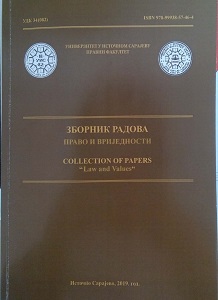Spor pune jurisprudencije u upravno-sudskom postupku-pravilo ili izuzetak?
The Dispute of Full Jurisdiction in the Administrative-Judical Procedure - the Rule or the Exception?
Author(s): Borče Davitkovski, Elena Davitkovska
Subject(s): Law, Constitution, Jurisprudence
Published by: Правни факултет Универзитета у Источном Сарајеву
Keywords: Administrative dispute; Administrative judicary; Full jurisdiction dispute; Oral hearing; Factual state;
Summary/Abstract: One particularly important topic when it comes to the interests of individuals and legal persons, as well as public authorities which deal with administrative matters and the Administrative Courts, is the construction of the administrative-judicial protection against the concrete administrative acts. Given the fact that the administrative dispute is the last instance in which Administrative Courts decide on formal and material legality of individual acts, the parties expect to be provided with the effective judicial protection. Namely, the parties expect the Administrative Court to issue a final decision which the competent authority will execute within 30 days.However, these expectations are not always met in the practice. There are cases when the competent authority decides to make a decision that does not comply with the instructions stated in the judgment. Thus, this paper focuses on the dilemma whether the parties’ (individuals’ and legal persons’) legal security is sufficiently protected in the cases where the Administrative Court only reaches a judgment for annulation, i.e. in the cases which are referred to as legality disputes; or, it is perhaps better for the parties if the Administrative Court decides in disputes of full jurisdiction more often. The latter type of dispute is the one where the Administrative Court does not merely set aside the individual act ex tunc, but it also resolves the administrative matter with its own decision (which replaces the act fully). There are pro and contra arguments for both approaches. Nevertheless, the European principles are set out in such a way that the judgments in disputes of full jurisdiction, which are based on a previously conducted oral hearing (where the Court will establish the factual state), become the rule, not the exception .On the basis of the above, it can be seen that in the paper we have used the comparative, the historical, and the normative methods. All this points to the necessary need for amendments and supplements to the Law on Administrative Dispute in the Republic of Macedonia with a view to more detailed regulation of the oral debate and the dispute of full jurisdiction.
- Page Range: 110-124
- Page Count: 15
- Publication Year: 2019
- Language: Serbian
- Content File-PDF

